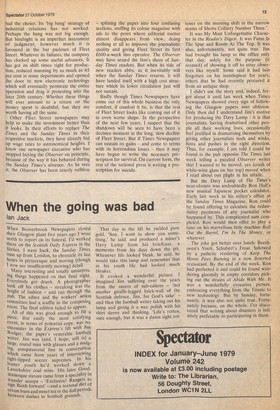When the going was bad
Ian Jack
When Beaverbrook Newspapers closed their Glasgow plant five years ago I went north to report on its funeral. I'd worked there on the Scottish Daily Express in the Sixties. I went back, the Sunday Times man up from London, to chronicle its last hours in picturesque and moving (though I now see insufficiently moving) detail. . . Many interesting and totally unsurprising things happened on that final night. Everybody got drunk. A photographer took off his clothes — streaking was the height of fashion — and ran through the Pub. The editor and the workers' action committee had a, scuffle in the composing room. The final edition failed to appear.
All of this was good enough to fill a Piece, But easily the most satisfying event, in terms of potential copy, was my encounter in the Express's lift with Jim Rodger, the paper's venerable football writer. Jim was (and, I hope, still Is) a large, round man with glasses and a nudging, Conspiratorial line in conversation Which came from years of interviewing tight-lipped soccer supremos. In his leaner youth he'd worked down a Lanarkshire coal mine. His later Goodmanesque stature came from a speciality in transfer scoops — 'Exclusive! Rangers to Sign Raith forward' — and a teetotal diet of cream buns and sweet tea in the dull periods between dashes to football grounds. That day in the lift he yielded pure gold. 'Son, I want to show you something,' he said, and produced a miner's Davy Lamp from his briefcase, a memento from his days down the pit. Whenever life looked bleak, he said, he would take this lamp and remember that in his youth life had looked much bleaker.
It evoked a wonderful picture. I imagined Jim suffering over the years from the sneers of sub-editors — 'not another giraffe-legged brick-wall of the Scottish defence. Jim, for God's sake' — and then the football writer taking out his lamp and giving it a wee polish with his shirt sleeve and thinking, 'Life's rotten, sure enough, but it was a damn sight rot
tener on the morning shift in the narrow seams of Shotts Colliery Number Three.'
It was My Most Unforgettable Character in the Reader's Digest. It was Fame Is The Spur and Room At The Top. It was also, unfortunately, not quite true. Jim had brought his lamp to the office only that day, solely for the purpose (it seemed) of showing it off to stray observers like myself. Some said it had lain forgotten on his mantlepiece for years; others that he had recently procured it from an antique shop.
I didn't use the story and, indeed, forgot about it until last week when Times Newspapers showed every sign of following the Glasgow papers into oblivion. Only then did I understand Jim's motive for producing the Davy Lamp : it is that journalists, having dramatised other people all their working lives, occasionally feel justified in dramatising themselves by giving other journalists nods and winks, hints and pushes in the right direction. Thus, for example, I am told I could be found in the pub opposite The Times last week telling a puzzled Observer writer that I wanted td be moved, yes (crash of white-wine glass on bar top) moved when I read about our plight in his article.
But the Davy Lamp of The Times's near-closure was undoubtedly Ron Hall's new musical Japanese pocket calculator. Early last week in his editor's office at the Sunday Times Magazine, Ron could be found offering to calculate the redundancy payments of any journalist who happened by. This complicated sum completed, Ron would then offer to play a tune on his marvellous little machine Roll Out the Barrel, I'm In The Money, or whatever.
The joke got better over lunch: Beethoven's Ninth, Schubert's Trout, followed by a pathetic rendering of Keep The Home Fires Burning in a now deserted restaurant. By the end of the week, Ron had perfected it and could be found Wandering gloomily in empty corridors picking out the strains of Abide With Me. It was a wonderfully evocative picture, embracing everything from the Titanic to new technolOgy. But by Sunday, fortunately, it was also not quite true. Fortunately because, on the whole, I've discovered that writing about disasters is infinitely preferable to participating in them.


































 Previous page
Previous page